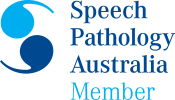A person’s discourse and the way their conversation flows can sometimes be overlooked when assessing for communication difficulties. This may be because the child’s verbal language understanding, grammar and vocabulary may be quite strong, which can mask difficulties with discourse.
Signs of difficulties with discourse include:
- Jumbled up or illogical flow of conversation.
- Missing references to key characters within a story.
- Mixing up of tenses throughout a conversation, although the use of tense may be correct. e.g. rather than explaining “Billy was playing football then started eating apples and once he finishes he will go home” the individual may instead say “billy started eating apples then he was playing football and he will go home.”
- Missing a start and end marker to the conversation or story.
- Difficulties with discourse may sound like the individual is unable to get to the point of their story. Or it may seem as though there is no point to their conversation.
These individuals are often able to tell you the basics of what happened without any trouble, in vivid detail and answer any questions you may have about the story or conversation you have just had, without asking questions. However, they are often unable to get their message across effectively. This may have a significant impact on numerous areas within everyday life which require clear and logical communication.
Conversational flow is important for these areas:
- Effective communication with family and friends when recounting their day or events they may have witnessed or hear about.
- Clarifying information provided to them by others
- Answering broader questions in a direct manner with a central point
- Summarising information written or orally at school or within the work place during presentations and other mandatory tasks.
Therapy for those who have difficulties with discourse
Discourse treatment is all about exposure and can be treated effectively by a trained speech pathologist. All speech pathology treatments, especially discourse treatment, should be tailored to meet the functional communication needs of the person. Therapy provides an abundance of opportunities to practice their newly learnt skills. This allows treatment to have real impact on everyday communication to reduce communication breakdowns and foster effective communication.
Contact us for results focused speech therapy
This article was written by our Speech Pathologist Ashleigh Fattah who is a Speech Pathology Australia member. If you require speech therapy, make an appointment. We‘ll provide you with simple and effective therapy targeted to your concerns. Contact us today.
The post Conversational Flow and Discourse appeared first on ENT Wellbeing Sydney.










